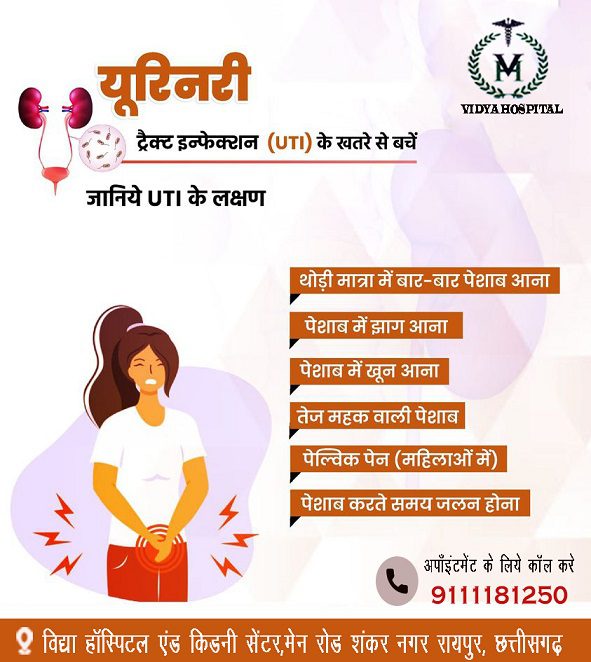Contents
- 1 What is a urinary tract infection (UTI)?
- 1.1 What is the urinary tract?
- 1.2 Who gets urinary tract infection (UTIs)?
- 1.3 What causes a urinary tract infection (UTI)?
- 1.4 What are the symptoms of a urinary tract infection (UTI)?
- 1.5 How are urinary tract infection (UTI) diagnosed?
- 1.6 How are urinary tract infection (UTI) treated?
- 1.7 What are the complications of a urinary tract infection (UTI)?
- 1.8 Can I become immune to the antibiotics used to treat a UTI?
- 2 BOOK CONSULTATION WITH THE BEST NEPHROLOGIST IN RAIPUR NOW
- 3 OR
- 4 EMERGENCY- CALL- 9111181250 24 hour Emergency and Ambulance services available.
- 5 BOOK CONSULTATION WITH THE BEST NEPHROLOGIST IN RAIPUR NOW
- 6 Vidya hospital and kidney centre
What is a urinary tract infection (UTI)?
A urinary tract infection (UTI) is an infection of the urinary system. This type of infection can involve your urethra (a condition called urethritis), kidneys (a condition called pyelonephritis) or bladder, (a condition called cystitis). Your urine typically doesn’t contain bacteria (germs). Urine is a by-product of our filtration system—the kidneys. When waste products and excess water is removed from your blood by the kidneys, urine is created. Normally, urine moves through your urinary system without any contamination. However, bacteria can get into the urinary system from outside of the body, causing problems like infection and inflammation. This is a urinary tract infection (UTI).
What is the urinary tract?
The urinary tract makes and stores urine, one of the body’s liquid waste products. The urinary tract includes the following parts:
Kidneys: These small organs are located on back of your body, just above the hips. They are the filters of your body — removing waste and water from your blood. This waste becomes urine.
Ureters: The ureters are thin tubes that carry urine from the kidneys to your bladder.
Bladder: A sac-like container, the bladder stores your urine before it leaves the body.
Urethra: This tube carries the urine from your bladder to the outside of the body.
Who gets urinary tract infection (UTIs)?
- Urinary tract infection is more common in women. This is because the urethra (tube the carries urine out of the body) in females is shorter and closer to the anus, where E. coli bacteria are common.
- Older adults also are at higher risk for developing cystitis. This increased risk may be due to incomplete emptying of the bladder. There are several medical conditions that can be related to this, including an enlarged prostate
- If you get frequent urinary tract infections, your healthcare provider may do tests to check for other health problems — such as diabetes or an abnormal urinary system—that may be contributing to your infections.
What causes a urinary tract infection (UTI)?
Urinary tract infections are caused by microorganisms — usually bacteria — that enter the urethra and bladder, causing inflammation and infection. Though a UTI most commonly happens in the urethra and bladder, bacteria can also travel up the ureters and infect your kidneys. More than 90% of bladder infection (cystitis) cases are caused by E. coli, a bacterium normally found in the intestines.
What are the symptoms of a urinary tract infection (UTI)?
A urinary tract infection causes the lining of the urinary tract to become red and irritated (inflammation), which may produce some of the following symptoms:
- Pain in the side (flank), abdomen or pelvic area.
- Pressure in the lower pelvis.
- Frequent need to urinate (frequency), urgent need to urinate (urgency) and Incontinence (urine leakage).
- Painful urination (dysuria) and blood in the urine.
- The need to urinate at night.
- Abnormal urine colour (cloudy urine) and strong or foul-smelling urine.
- Flank (side of the body) pain or lower back pain.
- Fatigue
- Fever (temperature above 100 degrees Fahrenheit) and chills.
- Vomiting
How are urinary tract infection (UTI) diagnosed?
Urinalysis: This test will examine the urine for red blood cells, white blood cells and bacteria. The number of white and red blood cells found in your urine can actually indicate an infection.
Urine culture: A urine culture is used to determine the type of bacteria in your urine.
Ultrasound: In this test, sound waves create an image of the internal organs.
Cystoscopy: This test uses a special instrument fitted with a lens and a light source (cystoscope) to see inside the bladder from the urethra.
CT scan: Another imaging test, a CT scan is a type of X-ray that takes cross sections of the body (like slices).
How are urinary tract infection (UTI) treated?
You will need to treat a urinary tract infection. Antibiotics are medicines that kill bacteria and fight an infection. Antibiotics are typically used to treat urinary tract infections. Some commonly used antibiotics can include:
- Amoxicillin
- Cephalosporin’s.
- Doxycycline
- Quinolones
It’s very important that you follow your healthcare provider’s directions for taking the medicine. Don’t stop taking the antibiotic because your symptoms go away and you start feeling better. If the infection is not treated completely with the full course of antibiotics, it can return.
What are the complications of a urinary tract infection (UTI)?
A urinary tract infection can be easily treated with antibiotics. However, if it isn’t treated or if you stop the medication early, this type of infection can lead to a more serious infection, like a kidney infection.
Can I become immune to the antibiotics used to treat a UTI?
Your body can actually get used to the antibiotics typically used to treat a urinary tract infection (UTI). This happens in people who have very frequent infections. With each UTI and use of antibiotics to treat it, the infection adapts and becomes harder to fight. This is called an antibiotic-resistant infection.
BOOK CONSULTATION WITH THE BEST NEPHROLOGIST IN RAIPUR NOW


OR
EMERGENCY- CALL- 9111181250
24 hour Emergency and Ambulance services available.
Can I prevent a urinary tract infection (UTI)?
Practicing good hygiene: You can often prevent UTIs by practicing good personal hygiene. This is especially important for women. Because the urethra in women is much shorter than it is in men, it’s easier for E. coli bacteria to move from the rectum back into the body.. Women should also use good hygiene practices during their menstrual cycle avoid infections. Changing pads and tampons frequently, as well as not using feminine deodorants can also help prevent UTIs.
Drinking plenty of fluids: Adding extra fluids, especially water, to your daily routine can help remove extra bacteria from your urinary tract. Drinking six to eight glasses of water per day is recommended.
Changing your urination habits: Urination can play a big role in getting rid of bacteria from the body. Your urine is a waste product and each time you empty your bladder, you’re removing that waste from your body. Urinating frequently can reduce your risk of developing an infection, especially if you have a history of frequent UTIs.
Changing your clothing: Avoiding tight-fitting clothing can actually help keep you dry, preventing bacteria from growing in the urinary tract. This will prevent extra moisture from getting trapped around your urethra.
What is the prognosis (outlook) for a person with a urinary tract infection?
Urinary tract infections (UTIs) typically respond very well to treatment. A UTI can be uncomfortable before you start treatment, but once your healthcare provider identifies the type of bacteria and prescribes the right antibiotic medication, your symptoms should improve quickly. It’s important to keep taking your medication for the entire amount of time your healthcare provider prescribed.
BOOK CONSULTATION WITH THE BEST NEPHROLOGIST IN RAIPUR NOW
To get more information about Urinary tract infection use the links below
Vidya hospital and kidney centre
Address: Shankar nagar Main road, Raipur(CG)
Email: vidyahospital32@gmail.com
Phone: 9111181250, 07714281198,9827197924